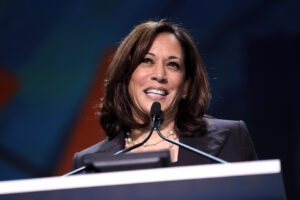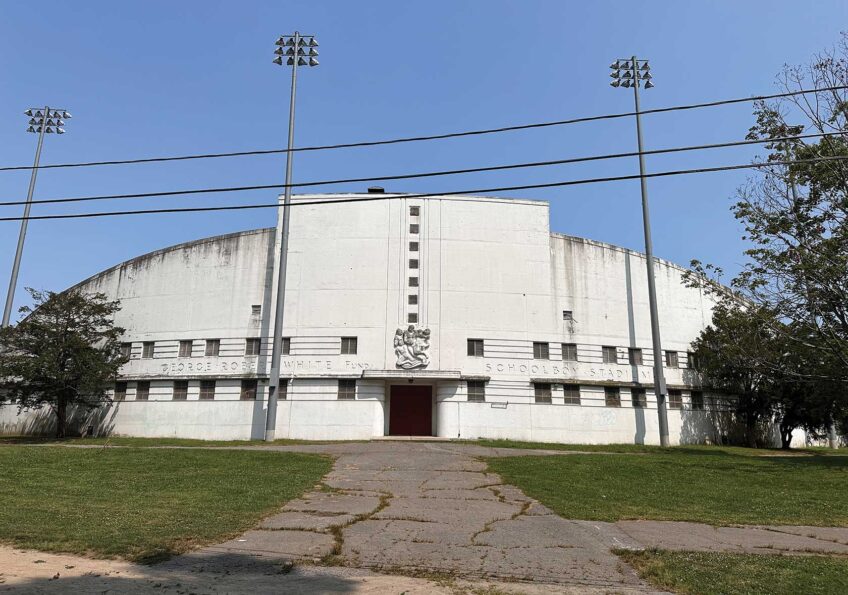
In 2024, national and statewide issues had major implications for Boston neighborhoods like Roxbury and Dorchester, where immigration and proposed construction projects were hot-button issues. The year was also filled with civil rights anniversaries, and as Boston reckoned with its past, the city, alongside the country, wrestled with how to move forward.
Grappling with immigration
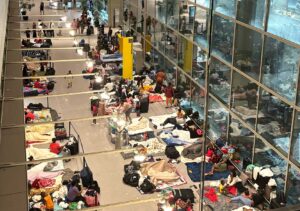
Dozens of families prepare to sleep in the international arrivals section of Logan Airport on Thursday, June 20. BANNER PHOTO
In fall 2023, Gov. Maura Healey announced that family shelters across Massachusetts had reached capacity. By January 2024, left with no options, migrant families, many of them Haitian, had taken to sleeping on the floor of the arrivals terminal at Logan Airport. So, when plans to use the Melnea A. Cass Recreational Complex in Roxbury to shelter migrant and homeless families emerged, community members and sports coaches juggled a mix of sympathizing with the families and feeling disappointed over the state’s lack of communication, with some saying the shelter was an example of Boston’s Black community shouldering the state and city’s burden yet again and losing out on necessary resources.
Still, neighbors and community leaders rallied to support the families. Bethel AME Church in Jamaica Plain opened its doors to some recently arrived Haitian families, offering shelter in its rectory. The church’s Migrant Neighbor Initiative provided living space, job support, and educational services to families seeking to make a new life in Boston, as the state, which has a “Right to Shelter” law, struggled to keep up with demand.
The families the Bay State Banner spoke to said they fled their countries for better opportunities or because they did not feel safe in their home country. In March, Haiti devolved into chaos as gangs took over the nation’s capital, and the resultant humanitarian crisis had personal implications for many local leaders in Boston, home to one of the largest populations of Haitians in the United States. Elected officials and nonprofit heads mobilized to help the country and called on Congress to take urgent action.
A spotlight on Franklin Park
Franklin Park, the largest expanse of green space in Boston, was at the center of controversies all year long. White Stadium, the 75-year-old sports arena in the park that has fallen into disrepair, is set to undergo significant renovations in preparation for use by a national women’s soccer team owned by Boston Unity Soccer Partners. A survey published by the Franklin Park Coalition showed majority support for the over $100 million renovation, but the redevelopment project received pushback from community members who feel it’s not in abutters’ best interests.
“The Franklin Park Defenders,” a group of neighbors and members of environmental nonprofit Emerald Necklace Conservancy, have stood firm in their protest against the project even though a judge ruled in support of the renovation and the Boston School Committee approved the lease.
Franklin Park neighbors also resisted plans to revamp the Lemuel Shattuck Hospital in the park’s vicinity as the state and Boston Medical Center seek to expand substance use treatment services. Elected officials chimed in during a City Council meeting to voice concern about Boston taking on a statewide issue.
Remembering desegregation and busing
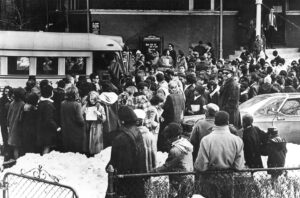
Students outside of Freedom School during 1964 Stay Out. 2024 marked the 60th anniversary of the Freedom Stay Outs. PHOTO: NORTHEASTERN UNIVERSITY ARCHIVES VIA PHYLLIS M. RYAN COLLECTION
This year also brought key anniversaries of significant moments in Boston’s history, the most notable of which was the start of school busing. In September 1974, Judge W. Arthur Garrity ordered that Black students be transported by bus to predominately white schools in the city after years of activism by Black civil rights leaders and parents.
The year of remembrance kicked off with the 60th anniversary of the Freedom Stay Outs of 1964, during which thousands of Black and white students boycotted their everyday schools to protest de facto segregation. Led by local activists like Hubert “Hubie” Jones, this oft-forgotten period in Boston’s history was a crucial step in achieving desegregation a decade later.
Desegregation in Boston would take 10 more years to begin, a whopping 20 years after segregation in schools was outlawed. The Boston Desegregation and Busing Initiative marked the anniversary of busing with a walking tour through downtown Boston, South Boston, and Roxbury, exactly 50 years to the day. Led by longtime community organizer Lewis Finfer, the trip included stops at sites integral to that part of the city’s past.
One of those places was City Hall Plaza, where lawyer and civil rights advocate Theodore “Ted” Landsmark, who is now a professor of public policy and urban affairs at Northeastern University, was attacked during an anti-busing riot two years after busing began. Photojournalist Stanley Forman captured the incident, and the image became the Pulitzer Prize-winning photo titled “The Soiling of Old Glory.” In March, Foley Hoag, the law firm that represented the families in the Morgan v. Hennigan (1974) court case that led to desegregation, reflected on what has and hasn’t changed since the violent reactions to desegregation and busing.
Honoring the past
Even without anniversaries to lean on, events throughout the city paid tribute to the past. Ruth Batson, a key player in the desegregation movement and the founder of METCO, was honored in Dorchester after the School Committee voted to rename Boston Community Leadership Academy/McCormack 7-12 School for her. Now called the Ruth Batson Academy, the school joined others like the John D. O’Bryant School and the Melvin H. King South End Academy in immortalizing the city’s civil rights icons.
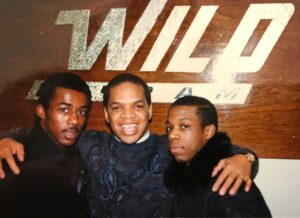
Elroy Smith is flanked by Ralph Tresvant and Michael Bivins of New Edition, 1980s. PHOTO: Elroy Smith
Performer Tony Wilson helped spectators at the Strand Theatre commemorate the moment in April 1968 when soul singer James Brown took the stage at Boston Garden the day after Martin Luther King Jr.’s assassination. Brown’s performance was said to have prevented Boston from breaking out into riots like other U.S. cities did, and Wilson’s show was a window into that feat.
The 1960s and 1970s were tumultuous decades in Boston, but on the airwaves, 1090-WILD kept Boston’s Black music scene alive, later giving a home to hits by the likes of Roxbury-bred boy band New Edition. In July, Elroy Smith, who programmed the station from 1983 to 1988, rreunited former employees and supporters to celebrate the now-defunct WILD.
In Newport, Rhode Island, an exhibition at the Rosecliff Mansion brought to the forefront the names of African American entrepreneurs who thrived during the Gilded Age, the 19th-century period marked by economic boom. The showcase included 150 items from as far back as the 18th century that spoke to how African Americans in Newport, Philadelphia, and Boston invested their wealth into building their communities.
The state of Black America by the numbers
In 2024, academic studies and nonprofit reports illuminated the ongoing challenges faced by Black people and people of color locally and nationally. A year after the Supreme Court effectively banned race-based admissions, colleges and universities like the Massachusetts Institute of Technology reported declines in enrollment of Black and Hispanic students. Among its class of 2028, 5% identify as Black or African American, compared to about 16%in previous years.
Two months before higher-education institutions began releasing demographic information for their first-year classes, experts expressed worry over how the Supreme Court’s decision had already begun to affect schools and businesses and wondered how it would impact diversity and inclusion in work settings and education.
In corporate settings, Black women already struggle. A study by scholars at Harvard University, Boston University, and MIT found that Black women with mostly white co-workers had higher turnover rates and lower promotion rates compared with their white counterparts. Black women were 51% more likely to leave their jobs earlier and 26% less likely to be promoted on time.
Many Black women in Boston are considering leaving the city, citing a lack of job availability and high cost of living. According to a March survey published by the Greater Boston Chamber of Commerce Foundation, 35% of young Black women are thinking about moving to a new city for want of better opportunities and inclusive social spaces. Sheena Collier, founder of Boston While Black, said the city needs to invest in “more physical gathering spaces that really are owned by Black people, programmed by Black people.”
Other reports highlighted challenges for Black homeowners and the coping skills Black Americans develop to to deal with discrimination..
Black women at the helm
Kamala Harris campaigned for president, the first Black and Indian woman to do so. While Harris ultimately lost to President-elect Donald Trump, she had the support of many, including Black women, 92% of whom voted for her, and her Alpha Kappa Alpha sorority sisters, who rallied behind Harris after she announced her bid in July.
While Harris took the national stage, Black women made waves throughout New England. In April, the U.S. Senate voted to confirm Judge Melissa DuBose to a post on the U.S. District Court for Rhode Island.
Boston-based public relations professional Colette Phillips published a book about why it’s important to include white men in discussions about diversity, equity, and inclusion, and Chaz Ebert stopped by Hummingbird Books in Chestnut Hill to discuss her new book, inspired by her late husband, film critic Roger Ebert.

